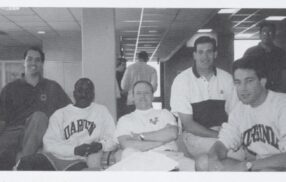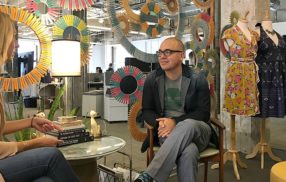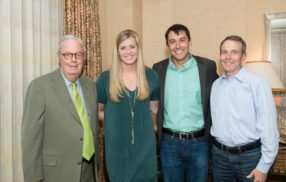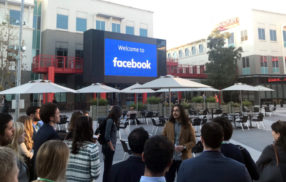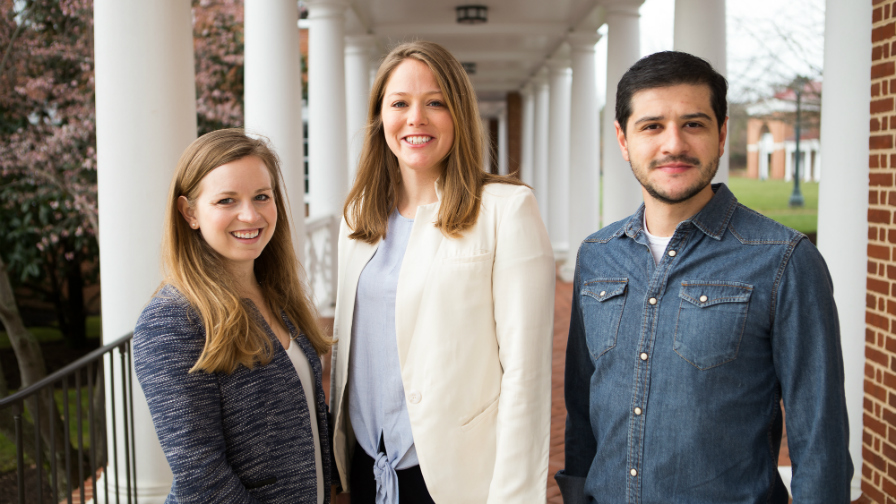
UVA Darden’s Technology Venture Fellows Share Their Summer Startup Experiences
By Dave Hendrick
For many students at the University of Virginia Darden School of Business, the desire to be part of a fast-paced, innovation-driven startup environment is a dream opportunity. For a select few, this dream becomes a reality thanks to the Technology Venture Fellowship (TVF), offered by Darden’s Batten Institute for Entrepreneurship and Innovation.
Now in its second year, Technology Venture Fellowships offer First Year Darden students the opportunity to interview with venture capitalists from top firms across the United States for paid summer placements in one of their high-potential, high-growth portfolio companies. Students selected through a highly competitive process receive a rare, hands-on experience with venture-backed companies, none of which typically recruit MBA interns.
This year’s TVF cohort — Class of 2019 students Kristen Podwika, Mary Julia Keller and Marcelo Costa de Sousa— spent their fellowships in New York, San Francisco and Atlanta, respectively. Now back in Charlottesville at Darden, they described their experiences in the program and plans for the future.
Kristen Podwika
Kristen Podwika spent her Technology Venture Fellowship at the New York City-based on-demand, e-commerce startup Gooten. The company’s CEO is Darden alumnus Brian Rainey (MBA ’10), and Gooten is backed by TVF sponsor KEC Ventures, whose managing partner is Jeff Parkinson (MBA ’10).
What appealed to you about the TVF program?
I came to Darden in part to explore more industries and I wanted to see what the startup world was like and learn more about venture capital. I was really interested in a position that would give me a more direct role in decision-making. TVF offered me the opportunity to get both VC and startup experience.
Can you describe your internship?
On my first day, I was put in charge of a noncore business unit relating to retail. Gooten was interested in understanding how this business unit could integrate with their core offerings and expand their footprint into a new market. To understand the retail space, I did a competitive analysis, market analysis and a lot of financial projections. While doing all of this research, I was also in charge of the day-to-day operations of the business unit, making decisions on website design, marketing and product offerings.
Was there a defining moment or lessons that stay with you?
I was responsible for a full business unit, which was overwhelming at times. One of the first lessons learned was to make sure all decisions can be mapped to a KPI, a key performance indicator, to really understand where the company wanted to go and what its priorities were. This way I could confidently make decisions and back up all decisions if they were questioned later down the road. A key characteristic that I needed to be successful was the willingness to be wrong, or to learn as you are going. If you make the wrong decision, you reanalyze and move forward again. This was critical in the fast-pace startup space.
How did your time at Darden prepare you for the experience?
Darden’s case method prepared me to have a response, even if I may not have been completely ready with an answer. That ability to think on your feet and have the confidence in your knowledge and past experiences is crucial in a startup environment.
How has this experience informed or influenced what you plan to do next?
I’m sponsored by Deloitte, and I’m going to go back after Darden. I definitely got bitten by the startup bug, and I loved the experience and the people. When I go back to consulting, I will definitely look for opportunities to continue to build my startup brand and knowledge within consulting.
Mary Julia Keller
Mary Julia Keller, who worked at Coca-Cola and Electrolux before Darden, spent her TVF experience at Rhumbix, a San Francisco-based construction technology company backed by Glynn Capital Management and TVF sponsor John Glynn, a UVA School of Law graduate and member of the Darden School Foundation Board of Trustees.
What appealed to you about the TVF program?
In Nashville, I had friends working on startups who did not have access to venture capital due to their location. It was clear that there was a disadvantage to startups working in venture capital-poor parts of the country. That resonated with me, and fairly early on at Darden I decided to focus on entrepreneurship, venture capital and finance. I met Whitney Hagan (MBA ’18), who did the inaugural TVF program, and she told me about the opportunity. I was intrigued because I had only ever worked at big companies and I was looking for something unique, and I thought it was so cool to have the opportunity to work in a startup and get exposure to venture capital at the same time.
Can you describe your internship?
Initially, I worked on a financial analysis for them, reviewing future funding opportunities and needs. I reviewed the options, ultimately advising the founders to move forward with my recommendation regarding which option to take. It was a fantastic way to dive in and learn the business.
While working on the operating plan, I saw there was not a clear method to project their Amazon Web Services cost. I built a time-series model that predicted instances and usage in order to understand their costs as they continued their growth. It reminded me of many First Year “Decision Analysis” cases at Darden.
The bulk of the summer, I spent investigating, isolating and removing potential points of friction in the sales process. This is where First Year was extremely helpful. Darden’s First Year prepares you for ambiguous situations.
I built an internal survey and an interview guide, using what we learn in design thinking to build a customer journey. I researched pricing strategies and presented what we had found at a leadership off-site. I’m continuing to work with their teams on a product strategy.
Was there a defining moment or lessons that stay with you?
Both founders went to Stanford GSB, and it was interesting to see how two non-technical founders have learned how to use their MBA to lead a tech startup.
How has this experience informed or influenced what you plan to do next?
I’m currently interviewing for roles in the tech industry in San Francisco. I really enjoyed the finance and product strategy work I did this summer, and I really enjoyed the pace of a startup. There’s a great Darden community out on the West Coast and you have the opportunity to meet them not just through social events, but engage with them via career coaching and mentoring. There are Darden people in all different aspects of what’s happening in the Bay Area and to be in the middle of it at a well-respected startup backed by big time VC was an incredible experience.
Marcelo Costa De Sousa
Marcelo Costa de Sousa has an undergraduate degree in electrical engineering and held various positions at the South American banking giant Itau before coming to UVA for the MBA/Master of Science in data science dual-degree program. With the goal of eventually helping businesses with digital transformation, he spent his fellowship with Atlanta-based fintech venture Kabbage, a portfolio company of BlueRun Ventures, whose general partner is Jonathan Ebinger (MBA ’93).
What appealed to you about the opportunity with the TVF?
The opportunity to work at a startup with a structured internship program was my key driver. I came to the MBA thinking about experiencing a startup, but I was a little skeptical when I started to research about interning at startups and saw that very few of them have well-organized internship programs. When I learned about TVF, I felt confident and got the energy I needed to pursue my initial idea because I knew I would have a solid experience, with mentoring, challenging projects and good feedback.
Can you describe your internship?
My internship could not have been better. I had the role I want to have after Darden. I was leading a strategic project with a high impact on the customer that was very technology and data-driven. Basically, we were using data to help Kabbage’s customers run their businesses by forecasting cash flows and providing tailor-made social media insights.
On my project, I had five other people working full time with me. A number of them were very talented data scientists, and I was responsible for translating the business and customers’ need into the technical implementation we would need. In the end, we were able to implement some features of the solution and ended the summer doing the handover of our project for the team at Kabbage that will finalize all implementation.
Was there a defining moment of the program that sticks with you?
There were a few great moments that I will remember for a long time. The first was when I heard people I didn’t know at Kabbage and had never worked with talking about some of our project’s findings and how our project was changing the company’s understanding of some concepts. I was happy to know that I was actually contributing to the company’s next steps.
The second was meeting and talking to people that have been at Kabbage since its beginning. With these chats, I learned about the challenges associated with each step of transforming an idea into a real business that is challenging the status quo of a very traditional industry.
How has this experience shaped your plans or ambition for the future?
This experience definitely woke my entrepreneurial side up. Kabbage is a great company. People there really take care of each other and make sure they are doing the best for the company. I felt a big connection to their culture and environment, and this will play a central role in my career’s next steps.
The University of Virginia Darden School of Business prepares responsible global leaders through unparalleled transformational learning experiences. Darden’s graduate degree programs (MBA, MSBA and Ph.D.) and Executive Education & Lifelong Learning programs offered by the Darden School Foundation set the stage for a lifetime of career advancement and impact. Darden’s top-ranked faculty, renowned for teaching excellence, inspires and shapes modern business leadership worldwide through research, thought leadership and business publishing. Darden has Grounds in Charlottesville, Virginia, and the Washington, D.C., area and a global community that includes 18,000 alumni in 90 countries. Darden was established in 1955 at the University of Virginia, a top public university founded by Thomas Jefferson in 1819 in Charlottesville, Virginia.
Press Contact
Molly Mitchell
Senior Associate Director, Editorial and Media Relations
Darden School of Business
University of Virginia
MitchellM@darden.virginia.edu


